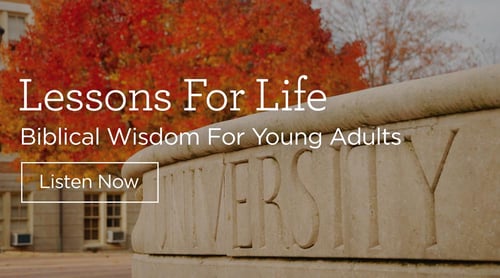
We live in a culture marked in many ways by self-promotion, selfism, and fierce individualism. For many, the ideal is to “be your best self,” to “live your best life.” It is to proclaim, “I am unique, and I will make much of my uniqueness. I define my own existence.” And as a new group of young adults graduates this year and embarks on life’s journey, commencement speakers are telling them things like this: “You are the most significant generation that has ever lived. You have gifts that can change the world. You have the opportunity to write your story, one day at a time.”
Older generations may complain that young people buy into such things—but those same older generations have already run the experiment. In a context of great freedom and self-definition, baby boomers have lived longer, worked longer, and nursed greater disappointments about how their lives turned out. They’re not, it would seem, truly happy. The outcome of a secular world—one in which individuals are encouraged to pursue the unattainable goal of finding and creating their own meaning—is a pervasive sadness underpinned by deep loneliness and emptiness.
In Jeremiah 9, we discover that when the people of Judah turned their backs on God, the way they tried to make sense of their existence was by and large the same way we do today. And the word this generation needs to hear is not the unfettered optimism of a commencement address but bold proclamation of the weeping prophet:
Thus says the Lord: “Let not the wise man boast in his wisdom, let not the mighty man boast in his might, let not the rich man boast in his riches, but let him who boasts boast in this, that he understands and knows me, that I am the Lord who practices steadfast love, justice, and righteousness in the earth. For in these things I delight, declares the Lord.” (Jer. 9:23–24)
Wisdom, Might, and Riches
Speaking through Jeremiah, God identifies three sources of self-confidence that, good though they may be, are ultimately less than the best.
The self-aware and the self-absorbed ultimately fail to feel self-fulfilled and thus are filled with self-pity.
First, he says, “let not the wise man boast in his wisdom.” The Preacher (that is, the writer of Ecclesiastes) realized the inadequacy of wisdom thousands of years ago, writing, “I have acquired great wisdom, surpassing all who were over Jerusalem before me, and my heart has had great experience of wisdom and knowledge”—and yet, he said, “this … is but a striving after wind” (Eccl. 1:16–17). Knowledge is empowering, but it is not in itself fulfilling. This is why Solomon said that “the fear of the Lord is the beginning of wisdom, and the knowledge of the Holy One is insight” (Prov. 9:10). God is the creator and sustainer of the universe, the one who sets up kings and brings them down. He has established the parameters of human existence. And as soon as education and knowledge are divorced from that, they are ultimately futile.
Second, Jeremiah declares, “let not the mighty man boast in his strength.” Hardly a day passes by when we don’t scroll past some ad for a product that’s trying to disprove what we know: that “all flesh is grass, and all its beauty is like the flower of the field” (Isa. 40:6). From the moment we are born, we are dying. Beauty, strength, vigor—all are temporary. And so, again, the Preacher says, “Remember also your Creator in the days of your youth, before the evil days come and the years draw near of which you will say, ‘I have no pleasure in them’; before … the dust returns to the earth as it was, and the spirit returns to God who gave it” (Eccl. 12:1–2, 7). Our might, too, has its ground in God, who formed us from the dust.
Finally, says the prophet, “let not the rich man boast in his riches.” Wealth can leave us while we live, and we have to leave it behind when we die. Money may be regarded as the universal provider of everything, but it doesn’t provide happiness. It is regarded as a universal passport, but it doesn’t gain us entry to heaven. As the Preacher says, “When goods increase, they increase who eat them, and what advantage has their owner but to see them with his eyes?” (Eccl. 5:11). God owns “the cattle on a thousand hills” (Ps. 50:10), and He gives “rains from heaven and fruitful seasons” (Acts 14:17). But those who seek satisfaction in these things will find they never satisfy.
From the moment we are born, we are dying. Beauty, strength, vigor—all are temporary.
Through Jeremiah, God warns of self-delusion—of thinking for a moment that we can make sense and significance of our lives by means of an agile mind, a healthy body, or a fat portfolio. It doesn’t work.
But God doesn’t leave it there. In verse 24, He offers an answer.
Love, Justice, and Righteousness
Having identified the sources of self-confidence that prove unworthy of our trust, God then says through His prophet, “Let him who boasts boast in this, that he understands and knows me.” Now, we can't understand God fully in the sense that we might master a school subject; however, as Proverbs 9:10 puts it, “knowledge of the Holy One is understanding” (NIV). In other words, we know God not by investigation and mastery but by revelation and submission. This is what it means to be a wise and understanding person. We can know God because God has revealed Himself to us, and what God has revealed are the glories that don’t fade. And they are worth boasting about.
First, God has revealed His steadfast love. As Jeremiah declares elsewhere, “The steadfast love of the Lord never ceases; his mercies never come to an end” (Lam. 3:22). The Hebrew word for “love” here is hesed, which refers to the unfailing, faithful covenant love of God. It is the same love of God that is revealed to us in the Lord Jesus Christ: “Greater love has no one than this, that someone lay down his life for his friends” (John 15:13).
Second, the very steadfast love of God runs alongside the absolute justice of God. This God whom we come to know rules in equity and in truthfulness. He is not arbitrary. His actions are always in keeping with His character. Consequently, because He is just, He punishes wrongdoing. And because He is love, He provided His Son as a substitute to die in the place of the sinner.
Where our attempts to define ourselves and our futures fall short, God extends a hand and offers something truly lasting.
Third, this God is righteous in all of His dealings. The psalmist says, “The Lord is righteous; he loves righteous deeds” (Ps. 11:7). God is good, and God does good—and in Jesus Christ, God incarnate, He has revealed His righteousness and has lovingly extended it to humanity. Furthermore, because God loves us, and because He has justified us, He also promises to make us righteous as we always were intended to be, to give us a “new self, which is being renewed in knowledge after the image of its creator” (Col. 3:10).
In God’s love, justice, and righteousness, we have a true and fulfilling purpose as His children. Knowing Him offers us not a short life of sadness, loneliness, and self-pity but “a living hope through the resurrection of Jesus Christ from the dead, to an inheritance that is imperishable, undefiled, and unfading” (1 Pet. 1:3–4). Where our attempts to define ourselves and our futures fall short, God extends a hand and offers something truly lasting.
Old Clay Pots
So as the graduation speakers preach, “You are the most significant generation that has ever lived,” what they ought to be saying instead is this: “You and I, we are just old clay pots. We are earthen vessels, given gifts by God, established by the steadfast love of God, brought into the wonder of His dealings with us in love and justice and righteousness in order that we might then give ourselves away for Him.” (See 2 Cor. 4:7.) Very few of us will be even a footnote in the history of the twenty-first century. But for you to take all of your wisdom, all of your physical prowess, and all of your capacity for enacting change and lay it all down at God’s feet is to know life as He intends it to be.
In a culture of self, we need a dose of humility. Humility is knowing that our wisdom, abilities, and resources are not enough to make life what we want it to be. It is knowing that God has made us, that God rules over us, and that there is nothing better for us than to live in the sphere of His steadfast love, justice, and righteousness. It is saying, “Jesus Christ, You have died to rescue me from my wrongdoing, and You have risen again so that I might also be raised to eternal life in righteousness. I have nothing to offer, but I want all that You have offered me. Let me boast in You alone.”

Topics: Articles